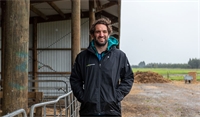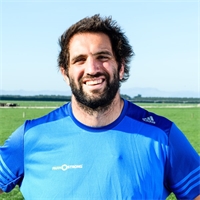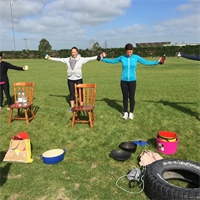Appreciating the ‘little wins’
WORDS & IMAGE PROVIDED BY FARMSTRONG
Otago high country farmer jack cocks has spent the past eleven years recovering from a life-threatening brain aneurysm. He’s given around 30 presentations, here and overseas, on how farmers can ‘thrive in the face of adversity’.
HOW COME YOU HAVE SUCH AN INTEREST IN RESILIENCE?
Twelve years ago, I was 35, had a beautiful wife and kids and was running a high country station. Life was marvellous. Fast forward 12 months and suddenly I was in a coma in ICU in Dunedin Hospital and life was pretty average. I’d had a massive brain aneurysm. Over the next two years I spent four months in the hospital and had eight major surgeries. Then, in years five and six after the aneurysm, scarring from the blood in my brain caused pressure issues and resulted in another four months in hospital and seven more surgeries.
I spent a lot of time in bed thinking about what I needed to do to recover and keep well. That’s why I decided to do a Kellogg study to see how other farmers dealt with adversity.
WHAT DID YOU LEARN?
I discovered there was lots of literature about climatic resilience, financial resilience and resilient farming systems but nothing about how we create more resilient farmers. A lot of people seem to think resilience is just about being able to take the hits and keep going, but there’s more to it than that.
SO WHAT DOES BEING RESILIENT MEAN?
I think resilience is the ability to thrive in the face of adversity, not just bounce back or survive but ‘thrive’ when things get tough. Even though you wouldn’t want to go through the experience again, you can use it to learn something that’s worth knowing about yourself and life.
WHAT PRACTICAL STEPS CAN FARMERS TAKE TO ACHIEVE THAT?
My Kellogg study showed farmers who thrive despite adversity have three things in common. First, they know their purpose. They know ‘why’ they’re doing what they’re doing. Second, they know their ‘who” - the key people who can help them through adversity and they connect regularly with them—family, friends, neighbours. Finally, they know their ‘what”—the things they need in their lives to keep well and be happy.
WHAT DO YOU DO TO MAINTAIN YOUR OWN WELLBEING?
Exercise is a big one for me. I’ll spend a bit of time on an exercise bike on the porch and do weights and balance exercises. Doing that for half an hour every day not only helps me physically, but it’s also good for me mentally.
WHAT ELSE HELPS YOU KEEP IN A GOOD HEADSPACE?
Practicing gratitude is big for me. The science of wellbeing says that just noticing and enjoying these little wins really improves our wellbeing. Over time, you actually rewire your brain and start focusing on the good things in life as opposed to focusing on the negatives.
Writing down three things I’m grateful for at the end of each day is something I’ve been doing for the past few years. If I’ve cooked an awesome family meal or one of the kids had a great game of rugby or we’ve got some good wool prices, I jot it down on my phone. Just doing that makes you feel better.
I think the key thing with wellbeing is adopting the Farmstrong message of ‘find out what works for you and ‘lock it in’. This is what works for me, but we’re all different.
Farmstrong is a nationwide, rural wellbeing programme that helps farmers manage the ups and downs of farming and growing. For free tools and resources visit www.farmstrong.co.nz
Related

Whether it’s extreme weather events or changing regulations, dealing with uncertainty is a constant...
Read More

Rugby has taught me heaps about how to look after yourself and handle stress. I reckon rugby and far...
Read More

A new 6-week programme to help women get in condition for the demands of calving season is about to ...
Read More